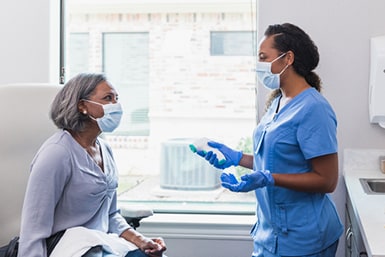Vaccine Safety Information for Healthcare Providers

Healthcare providers are essential, longstanding partners in the safe administration of vaccines. They ensure safety from the moment vaccines arrive at a facility to when they are administered to patients.
Storage and handling of vaccines
Proper storage and handling of vaccines by healthcare providers helps to ensure vaccines remain potent so that they result in an adequate immune response in the patient. CDC provides vaccine storage and handling resources to educate providers on best practices.
Administering vaccines
When caring for patients, healthcare providers evaluate whether additional vaccines are indicated based on a patient’s existing medical conditions or age to ensure that patients receive all recommended vaccines. Providers share important information about vaccine benefits, risks, and common vaccine safety concerns. They also screen patients for vaccine contraindications (such as history of severe allergic reactions) and precautions, which guide the decision around whether or not certain vaccines are recommended for an individual patient. While severe, life-threatening reactions following vaccinations are rare, providers should be prepared to manage reactions should they occur. CDC resources for providers on these topics include vaccine precautions and contraindications and managing vaccine reactions.
Reporting adverse events
Healthcare providers also contribute to what we know about vaccine safety by reporting clinically important adverse events following vaccination. The Vaccine Adverse Event Reporting System (VAERS) is the nation’s frontline system for monitoring vaccine safety. While anyone can submit a report, the system depends on healthcare professionals to report adverse events should they occurexternal icon. The information shared in VAERS reports helps CDC and FDA keep vaccines safe for everyone.
- medical icon
Safety Information by VaccineThe latest safety information from CDC on recommended U.S. vaccines.
- question icon
Talking to Patients about Vaccine SafetyHow to answer common questions about vaccine side effects and other vaccine safety issues.
- device icon
Reporting Adverse EventsWhat adverse events to report to VAERS, how to submit reports, and why.
- book icon
Resources for Healthcare ProvidersVaccine safety training and continuing education, reports, and publications.
- Vaccine Safety ResearchThe latest safety research on U.S.-licensed vaccines.
- Vaccine Adverse Event Reporting System (VAERS)Information about the national vaccine safety surveillance system run by CDC and the Food and Drug Administration.
- Vaccine Information StatementsSearch through the information sheets produced by CDC that explain both the benefits and risks of vaccines.
- Vaccines for Children ProgramInformation about The Vaccines For Children (VFC) Program that provides vaccines at no cost to those who are eligible.
- Vaccination Schedules For Health Care ProfessionalsLearn about CDC’s official immunization schedule for children, preteens, teens, and adults.